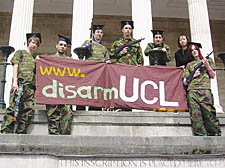| |

University College London students make their feelings known
|
Students go to war against uni’s arms company funding
Anger at investment in firm that produces weapons parts for the Middle East
FURIOUS students have criticised their university for using their fees to “fund murder” and line the pockets of wealthy arms companies.
Camouflaged campaigners wearing mortarboards and wielding toy guns stormed the main quad of University College London last week to protest against university bosses’ ongoing decision to fund Cobham Plc, an arms company that supplies weapons parts to conflicts in the Middle East.
But yesterday (Wednesday), while controversy raged on the UCL campus, a few miles away in the City, Cobham Plc held its annual meeting, reporting “good” profits and an order book from contractors worth more than £1.7bn.
Richard Wilson, a UCL graduate whose sister died at the hands of a militia in Burundi, said: “By handing this company (Cobham Plc) over £900,000, with which to do business, UCL is making itself complicit in that business, and its impact on the world.”
A petition signed by more than 1,000 UCL staff and students was handed to UCL Provost Malcolm Grant, urging him to sell the university’s shares in arms company Cobham Plc.
The Disarm UCL campaign, which was set up in December, calls for the university to adopt an ethical investment policy.
Ed Hood, a student and campaigner, said: “There is no reason at all to invest in a business which kills.
“Financially, UCL would do equally as well if it were to invest in ethical business.
“UCL prides itself as a global university. We want a global university to show a global conscience.”
The university currently holds £1.5m worth of shares in the multi-national arms companies Cobham Plc and Smith Group, who make fighter jets and weapons parts.
These investments, including £900,000 invested in Cobham Plc alone, make UCL the biggest-known university investor in the arms trade in the UK.
Malcolm Grant, Provost for UCL, has previously defended the decision to invest in arms companies in the past, saying that neither company “manufactures entire weapons themselves”. |
 |
| |
|
|


